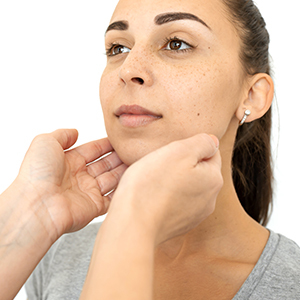
The prevalence of thyroid disorders in America has reached epidemic proportions and it's only getting worse. Hashimoto's disease, also known as lymphocytic thyroiditis or autoimmune thyroiditis, is the most common thyroid disease. It's characterized by chronic inflammation of the thyroid gland, reducing the gland’s normal function. Reduced thyroid function is called hypothyroidism and is often associated with weight gain, lethargy, and inadequate growth in children.
What Causes Hashimoto's Disease?
Hashimoto's occurs when the immune system deviates from its normal function and begins to attack healthy cells in the thyroid as if they were foreign invaders. The immune system attacks the thyroid by producing antibodies, slowly deteriorating the gland's ability to produce thyroid hormones. The aggregation of white blood cells, or lymphocytes, propels the process behind Hashimoto's disease. [1] [2]
Over 20 million people are estimated to have Hashimoto's disease. Compared with men, women are 7-9x more likely to be diagnosed with the disorder. It seems that estrogen dominance in women reduces iodine absorption in the thyroid, possibly contributing to the increased risk in the female population. [3] Genetic predispositions are often key factors in Hashimoto’s disease, and scientists have recently discovered five different genes that are integral to this disorder. [4]
Signs and Symptoms of Hashimoto's Disease
As the disease progresses, the thyroid gland may enlarge, giving the appearance of a swollen neck. Known as goiter, it's commonly associated with hypothyroidism, a symptom related to Hashimoto's disease. An underactive thyroid associated with Hashimoto’s disease usually results in:
- Fatigue
- Listlessness
- Weight gain
- Sluggish metabolism
- Lethargy
- Cold intolerance
- Paleness and puffiness in the face
- Joint and muscular aches
- Constipation
- Dry, brittle, thinning hair
- Irregular periods
- Depression
- Shallow/slowed heart rate
- Difficulty conceiving
With many of these symptoms, it isn't uncommon that some patients are diagnosed with depression before they are diagnosed with Hashimoto's disease. For some individuals, Hashimoto's disease may present little to no symptoms, making it harder for doctors to diagnose or treat crucial thyroid issues.
References (4)
- Katja Zaletel and Simona Gaberscek.Hashimoto’s Thyroiditis: From Genes to the Disease. Current Genomics. December 2011; 12(8):574-588.
- Dimitry A. Chistiakov. Immunogenetics of Hashimoto’s thyroiditis. Journal of Autoimmune Diseases. 2005, 2:1.
- Cutolo M, Capellino S, Sulli A, Serioli B, Secchi ME, Villaggio B, Straub RH. Estrogens and autoimmune diseases. Annals of the New York Academy of Sciences. 2006 November;1089:538-47.
- Eric M. Jacobson, Ph.D. and Yaron Tomer, M.D. The CD40, CTLA-4, Thyroglubulin, TSH Receptor, and PTPN22 Gene Quintet and Its Contribution to Thyroid Autoimmunity: Back to the Future.J Autoimmun. 2007; 28(2-3): 85–98 - FACP
†Results may vary. Information and statements made are for education purposes and are not intended to replace the advice of your doctor. If you have a severe medical condition or health concern, see your physician.







